LBS2ITS Newsletter No. 16

Academics from Department of Town & Country Planning, University of Moratuwa (UoM) Sri Lanka visit the Chair of Mobility System Planning, Dresedern University of Technology (TUD), Germany
May 26 – June 26, 2024
Dr. Chethika Abenayake and Dr. Amila Jayasinghe research and teach at the Department of Town and Country Planning at the University of Moratuwa in Sri Lanka. In June, they completed a guest stay at the “Friedrich List” Faculty of Transport and Traffic Sciences as part of the LBS2ITS project and joined researchers from the Chair of Mobility System Planning.
More:
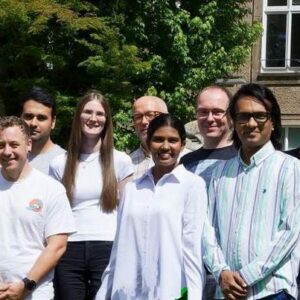
Amila Jayasinghe
LBS2ITS Newsletter No. 15

ERASMUS+ Info Day Session on Capacity Building in Higher Education (CBHE), Sri Lanka
July 3, 2024
We are pleased to announce our participation in the ERASMUS+ Info Day Session on Capacity Building in Higher Education (CBHE), organised by the Ministry of Higher Education. This distinguished event featured the expertise of Mr. Eugenio Delfino (CBHE Project Advisor at ERASMUS+ Higher Education- Europe Commission) and honoured guests including H.E the Ambassador to the European Union, Hon. Minister of Education, Hon. State Minister of Higher Education, Secretary to the Ministry of Education, and Vice Chancellors of Sri Lankan universities.
📅 Date: 3rd July 2024
📍 Venue: Hotel Galadari, Colombo, Sri Lanka
Dr. Amila Jayasinghe, the Sri Lanan team coordinator of the LBS2ITS project from the University of Moratuwa, presented the exemplary practices of the “LBS2ITS” project, which is supported by a consortium of three EU and four Sri Lankan universities. His presentation underscored the practical impacts and benefits of the project, highlighting how it creates a fully immersive and integrated teaching and learning experience. He emphasized that the LBS2ITS project successfully inculcates not only knowledge and skills but also attitudes and motivation towards sustainable development through developed PBL learning modules. Additionally, he mentioned that learning from EU universities helps Sri Lankan universities adopt innovations such as integrating disciplinary and domain knowledge into modules, incorporating digital technologies, and revolutionising Sri Lankan higher education towards University 3.0 in curriculum and teaching practices.
Dr. Pradeep Kalansooriya from General Sir John Kotelawala Defence University also participated in the programme, further enriching the collaborative spirit of the event.
This Info Day Session is anticipated to greatly benefit Sri Lankan universities and higher educational institutes by facilitating access to more grant opportunities aimed at enhancing institutional capacity, promoting internationalisation, empowering students and staff, and fostering innovation and development.
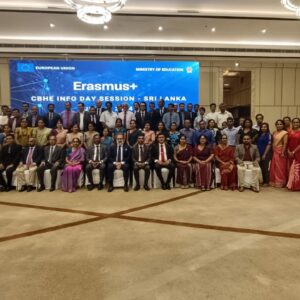
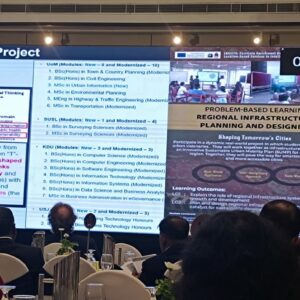
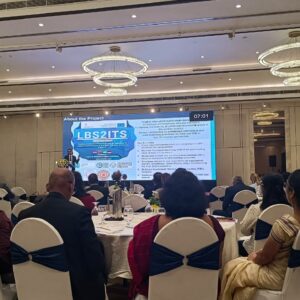
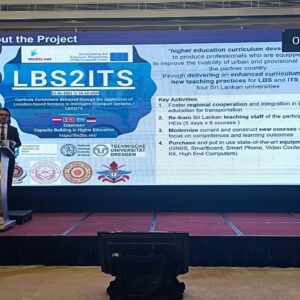
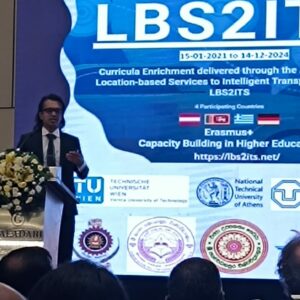
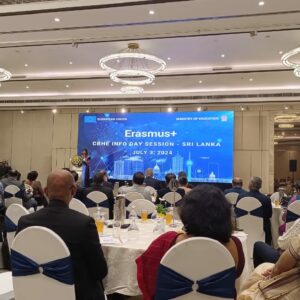
Amila Jayasinghe
LBS2ITS Newsletter No. 14

Training Programme, Technische Universitat, Dresden
May 26 – Jun 26, 2024
Chethika Abenayake and Amila Jayasinghe from the Department of Town & Country Planning, University of Moratuwa, participated in a one-month training at the Chair of Mobility Systems Planning at Technische Universität Dresden, Germany. This training was part of the Erasmus+ co-funded project, ‘Curricula Enrichment for Sri Lankan Universities through Location-Based Services to Intelligent Transport Systems’ (LBS2ITS). The programme featured diverse knowledge-sharing and capacity-building activities, offering valuable insights into advanced teaching methodologies.
Key Highlights:
- Sharing Research Works: Presentations and follow-up discussions provided feedback on content and opened avenues for future collaborative research.
- Problem-Based Learning Studio: Experiences and sample outputs from student group projects facilitated discussions on improving mentoring and assessment processes.
- Lectures and Practical Sessions: Exposure to TU-Dresden’s teaching and learning activities enhanced overall delivery methods.
- Quality Assurance: Detailed conversations on improving student feedback processes based on discussions about quality assurance policies, procedures, and practices.
- Science Night and Open Day: Participation in TUD’s events provided insights into public engagement and outreach in scientific communities.
- Collaboration and MoU Discussions: Potential collaborations with TUD, including joint teaching, degree programs, student exchanges, and research collaborations, were explored.
- Field Study of Dresden’s Transport System: Practical insights were gained by studying Dresden’s transport system, informing curriculum enrichment efforts back home.
- Technical Know-How on SUMPs: Engagement with planning professionals about Sustainable Urban Mobility Plans (SUMPs) was particularly enlightening.
Further, the module descriptors developed by the University of Moratuwa were discussed, aiming to enhance the curricula of degrees offered by the Department of Town & Country Planning and the Traffic Engineering Division, Department of Civil Engineering.
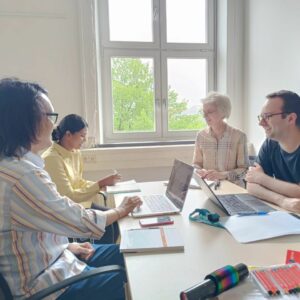
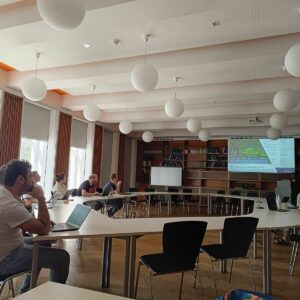
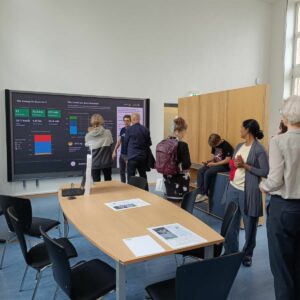
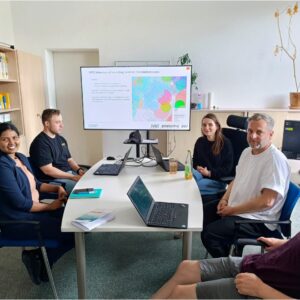
Amila Jayasinghe
LBS2ITS Newsletter No. 13

Training Programme, TU Wien
May 15 – Jun 13, 2024
‘Re-training of teachers in the EU with an emphasis on gender equity’, a training programme aligning to the ERASMUS+ project of Curricula Enrichment delivered through the Application of Location-based Services to Intelligent Transport Systems (LBS2ITS) was held during the period of 15th of May 2024 to 13th of June 2024 at the Department of Geodesy and Geoinformation at the Vienna University of Technology (TU Wien), Austria.
Dr. Dushyanthi Vidanagama, Senior lecturer from Faculty of Computing participated for this training programme representing Gen. Sir John Kotelawala Defence University, Sri Lanka. Ms. Supuni Mahisha Nissanka, who is the Research Assistant of University of Sri Jayewardenepura, Sri Lanka involving in the ERASMUS+ project of LBS2ITS participated for this programme.
During the period, they supervised assignment group projects related to the module named ‘Location based Services’ lectured by Prof. Retscher Guenther which is conducted under the degrees of the International Master of Cartography and Master of Geodesy and Geoinformation at TU Wien. Aligning to that, Dr Dushyanthi delivered a guest lecture on ‘Big Data Analytics with Machine Learning’ and a seminar on ‘Machine Learning for Location-based Services’. Ms Supuni conducted a guest lecture on ‘Use of Smart Phone Data in Transportation’ and a seminar on ‘Enhancing Urban Planning through Location-Based Services: Smart Cities for a Sustainable Future’.
During the visit, they had discussions on research collaboration with Univ. Prof. Dr.-Ing.Hans-Berndt Neuner, Head of the Engineering Geodesy Research Division, Dr. Jelena Gabela Majic, Project Coordinator of LBS2ITS and Mr. Max Brandstätter, Univ. Ass.Dipl.Ing., both members of the Engineering Geodesy Research Division, and Ms. Andrea Binn, Univ.Ass.in the Research Division Cartography.
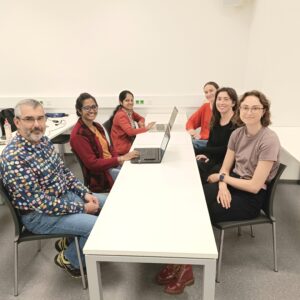
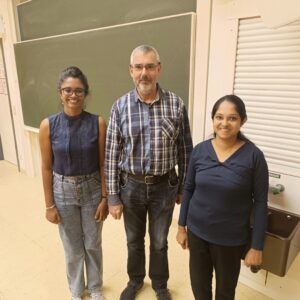
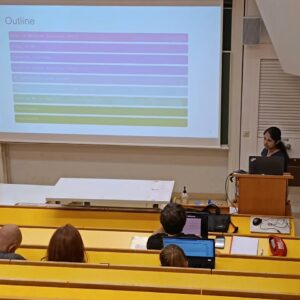
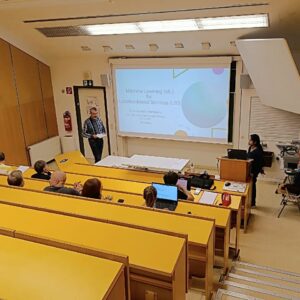
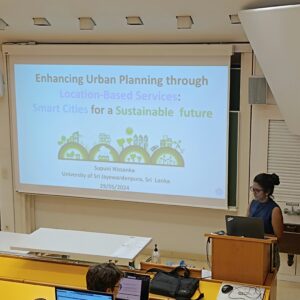
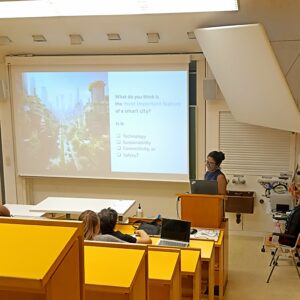
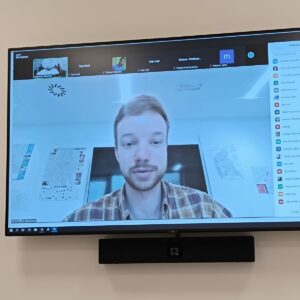
Guenther Retscher
LBS2ITS Newsletter No. 12

LBS2ITS “Curricula Development” meeting
January 22, 2024
From 18-21 December 2023, the LBS2ITS “Curricula Development” meeting was held in Athens at the School of Rural and Surveying Eng. and Geoinformatics Engineering of the National Technical University of Athens (NTUA). The overall goal of the meeting was to report, to discuss and advance the progress concerned with the schedule related to the modernization of the academic curriculum of the four partner Universities in Sri Lanka.
On the first day, following a briefing on the progress attained by each partner University on the topic, the meeting has focused on detailed presentation and discussions concerned with the modernization of existing academic courses and the development of new ones according to the schedule drawn up for each partner University at a previous stage. All proposed courses were discussed thoroughly and on an individual basis using specifically designed templates that outline course identity (i.e., overview, learning outcomes, academic skills, content, learning methods, etc.) and facilitate standardization of the process. Emphasis placed on the learning methods to be adopted, and the implementation stages to be followed (including accreditation) upon completion of course preparation.
In addition to course development monitoring, the Athens meeting included a detailed presentation and a visit at the Traffic Management Center (TMC) of the Attika Region (greater Athen’s area). The event was organized tightly to reflect the scope and specificities of the LBS2ITS project, while all participants had the chance to observe in real-time and discuss traffic management operations.
Besides, in the frame of extroversion of the LBS2ITS project, the participants also attended RobPos4VApp workshop that was deliberately organized within the timeline of the meeting. This final event workshop included presentations on the RobPos4VApp (“A Methodological Framework for Low-cost Cooperative DGNSS/INS-based Robust Positioning in Safety Critical Connected Vehicle Applications”) project, the topic of which is directly relevant to the LBS2ITS project. Also, presentations were given by several invited speakers from Italy, Finland and Greece.
In the last day, the meeting was closed with a project management session that reviewed pending issues and planned on upcoming activities.
We thank our European partners from TUV and TUD and our Sri Lankan participants from SUSL, UOM, KDU and USJ for contributing a productive and collaborative environment and a nice atmosphere throughout the course days. It was an enriching experience, and we appreciate their active involvement and contribution to the Curricula Development meeting.
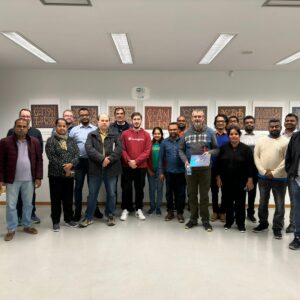

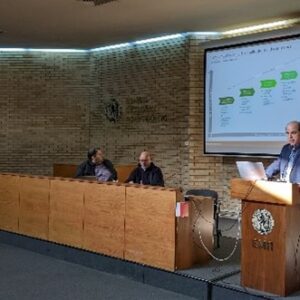
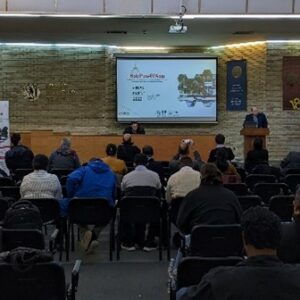
Vassilis Gikas
LBS2ITS Newsletter No. 11

Train-the-Teachers Course on “PNT Theory and Practice”
September 19, 2023
From 2-6 May 2023, the train-the-teachers (TTT) course “PNT Theory and Practice” in the LBS2ITS project was held at the Faculty of Geomatics of Sabaragamuwa University of Sri Lanka (SUSL) in Belihuloya. PNT stands for Positioning, Navigation and Timing and covers a wide range of positioning, navigation and localization technologies and techniques. Apart from lectures, which covered basic theories and applications, a special emphasis was given on practical examples and hands-on experiences during the course. The equipment funded and purchased by the LBS2ITS project was employed for the practical tasks. Special dedicated lab facilities for the LBS2ITS project equipment were established at SUSL, and they were used during the course. The course participants also reported on their previous use of PNT equipment. Several student projects, such as environmental mapping of neighbourhoods in the Colombo area, including a waste dumping ground and a tree cadastre in the University of Moratura campus, were discussed and evaluated. New ideas for future use of the PNT equipment and their solutions were also gathered and developed. The course attendees gave very positive feedback on the course materials and practicals.
TU Wien, Vienna, Austria, and NTUA, Athens, Greece jointly delivered the course lectures. They covered a wide range of topics, from the most up-to-date satellite positioning techniques with Global Navigation Satellite Systems (GNSS) on high-end and low-cost receivers and other mobile devices to absolute and relative positioning techniques for different applications. Emerging and current alternative PNT technologies, such as Wireless Fidelity (Wi-Fi), Ultra-wide Band (UWB), Inertial Navigation Systems (INS), were covered during the course as well. The course also mostly presented PNT techniques that are application-oriented for Location-based Services (LBS) in Intelligent Transport Systems (ITS). The SUSL were significantly involved in the preparation and on-site organisation and helped very much for the success of the fifth TTT course.
Participants from all four Sri Lankan partner universities in LBS2ITS took part and formed an interdisciplinary and engaged group with backgrounds in civil engineering, surveying, geomatics, computer science, town planning and transportation. Furthermore, several students of the Department of Surveying and Geodesy of SUSL participated in the practicals and lectures. They could assist all attendees to get familiar with the geodetic high-end GNSS equipment. The sports ground of the SUSL campus was used for several field tasks, such as topographic mapping of the environment, establishment and setting-out of control points, navigation along predefined trajectories in stop-and-go and kinematic mode, etc.
Course contents, learning environments, and quality control measures for the course modules and individual courses to be developed in LBS2ITS were examined and evaluated through discussion and analysis. As a result, attendees gained valuable insights and perspectives that can be applied to enhance the quality and effectiveness of their teaching practices.
We thank our Sri Lankan hosts at SUSL and workshop participants from UOM, KDU and USJ for creating a productive and collaborative environment, warm hospitality and a nice atmosphere throughout the course week. It was an enriching experience, and we appreciate their active involvement and contribution to the TTT course.
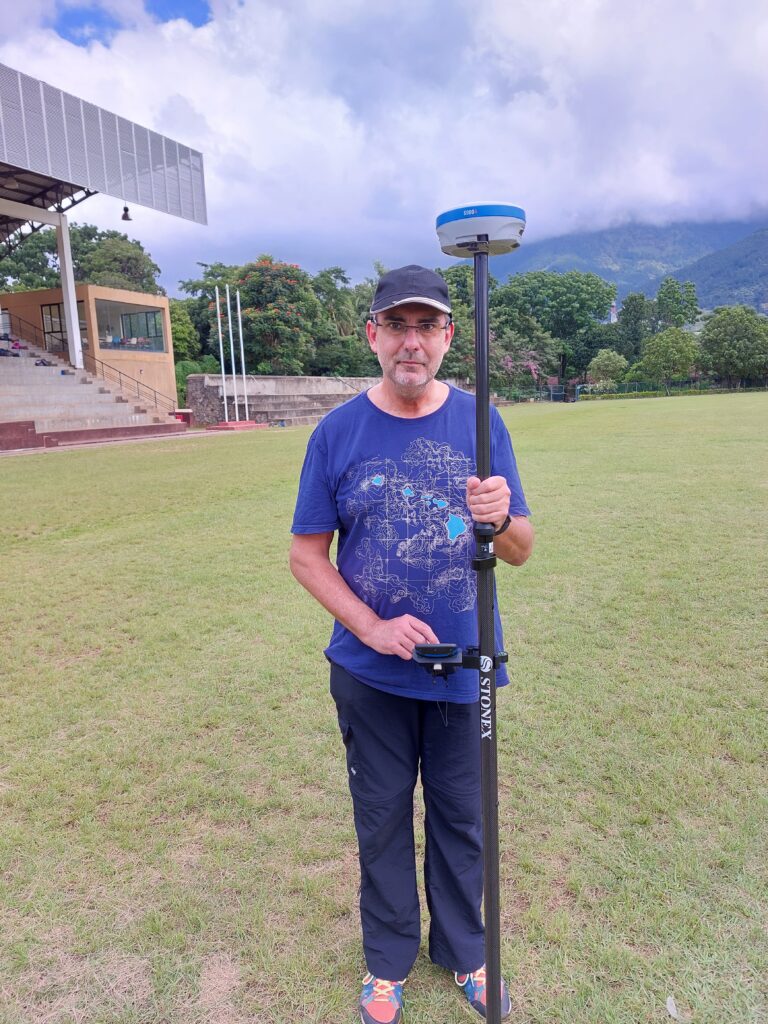
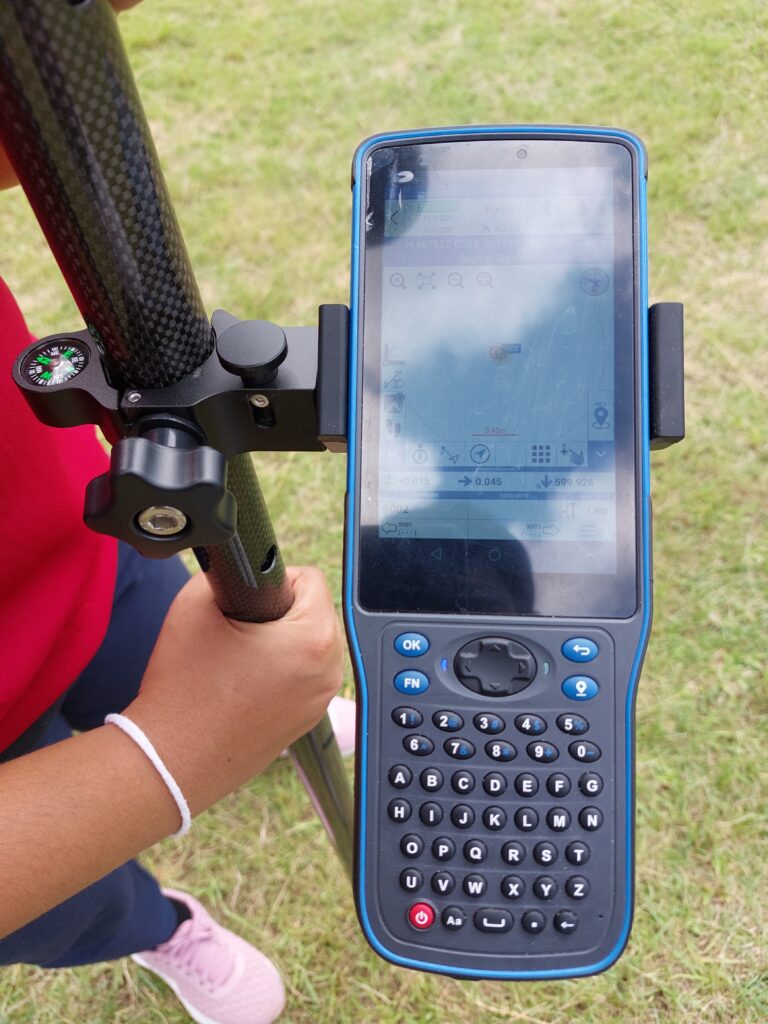
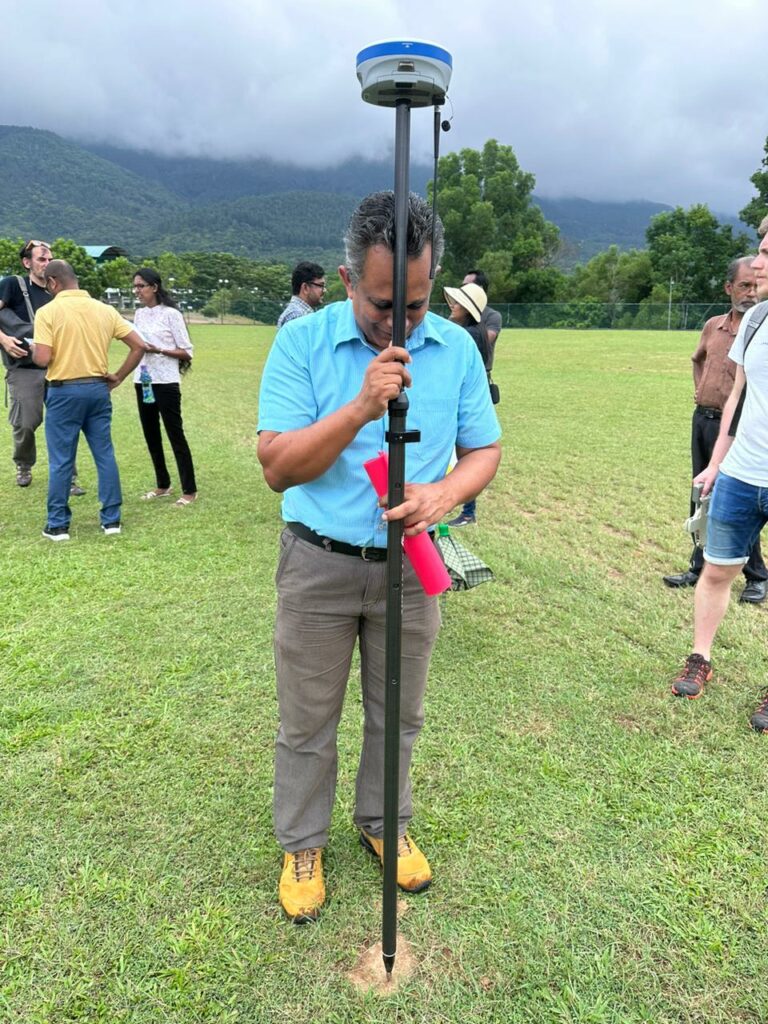
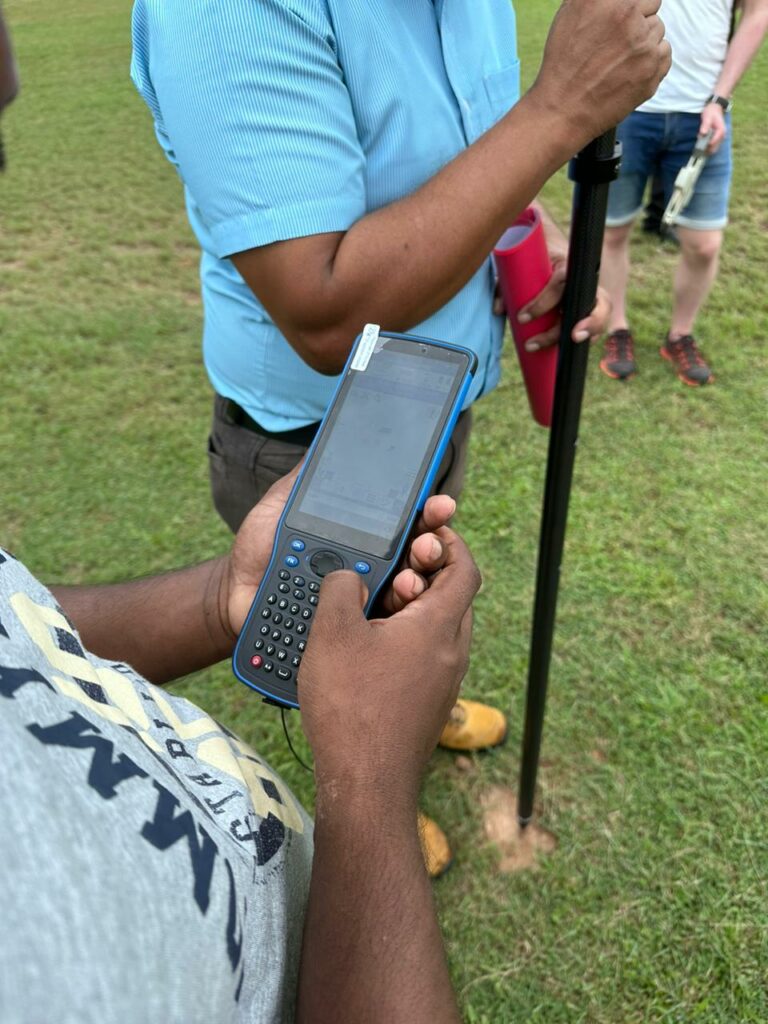
Guenther Retscher
LBS2ITS Newsletter No. 10

Train-the-Teachers Workshop on Location-based Services and Multimedia Cartography
March 10, 2023
From 20-24 February 2023, the General Sir John Kotelawala Defence University (KDU) in Colombo, Sri Lanka, hosted the third train-the-teachers workshop of the LBS2ITS project. The primary objective of this workshop was to train the participating lecturers from the four Sri Lankan partner universities in domain knowledge regarding Location-based Services (LBS) and Multimedia Cartography, as well as on didactic strategies and concepts.
Upon being warmly welcomed by Vice-Chancellor Major General Milinda Peiris, approximately 25 lecturers and academic staff members from the four Sri Lankan partner universities attended the workshop held by Prof. Georg Gartner and Univ. Ass. Andrea Binn from the Research Unit Cartography at TU Wien, Austria. The participants represented diverse academic backgrounds, including geodesy, urban planning, computer science, and transportation.
The workshop was designed to offer a balanced mix of theoretical, interactive, and practical sessions on LBS and Multimedia Cartography, following the idea of “why-what-how”. Thus, WHY is teaching students about Location-based Services and Multimedia Cartography relevant and in which context, followed by WHAT content can be taught and what it aims to teach to develop specific skills and competencies related to LBS2ITS. Lastly, the workshop focused on discussing various strategies HOW to pursue the education of LBS and multimedia cartography, including active learning, problem-based learning (PBL), and curriculum development.
In addition to offering 15 sessions on the “WHY”, “WHAT”, and “HOW” topics, key interventions have been on interacting and discussing best practices and sharing and exchanging experiences. These interventions provided an opportunity for participants to consider crucial concepts related to curriculum development and course design, particularly in the context of integrating innovative topics such as LBS2ITS. Possible course contents, learning environments, and quality control measures for syllabi were examined and evaluated through discussion and analysis. As a result, attendees gained valuable insights and perspectives that can be applied to enhance the quality and effectiveness of their teaching practices.
In addition to the workshop program, participants also had the opportunity to visit the KDU Museum and the University of Moratuwa to learn more about the history of KDU and the teaching culture of Sri Lanka.
We thank our Sri Lankan hosts and workshop participants for creating a conducive collaborative environment and warm hospitality throughout the week. It was an enriching experience, and we appreciate their active involvement and contribution to the workshop.

Georg Gartner and Andrea Binn
LBS2ITS Newsletter No. 9

LBS2ITS at SUSL GEOWEEK2022
January 26, 2023
The Faculty of Geomatics have been one of the leading institutes in South Asia in the discipline of Spatial Sciences since early 2000s. The Faculty of Geomatics, established in 2004, being the successor of the department of Surveying Sciences (introduced in 1997) celebrated its 25th birthday on 27th of November 2022. As a part of the celebrations, a first event of the faculty named the GEOWEEK was initiated and conducted from 29th of November to 3rd of December 2021. The initiation of the mega event in the Geo-spatial industry of Sri Lanka, GEOWEEK2021 drove the academia and the geospatial industrial community to a single platform of spatial sciences and applications, promoting research in its discipline and scientific exchange among researchers and scholars. Then as a continuation of the event in 2022, as requested by the vendors, GEOWEEK2022 was organized at a bigger scale compromising several events including GeoSYM, the international research symposium held at the main auditorium of Faculty of Geomatics, Sabaragamuwa University of Sri Lanka and GeoExpo, the exhibition held at BMICH, Colombo. The expansion of the event attracted a vast audience to the event in comparison to last year.
There were a number of pre-GEOWEEK programs like kids mapping competition, seminar series on Surveying for Advanced Level students and workshops on GIS and remote sensing for undergraduate students of Faculty of Geomatics. GEOWEEK2022 was held from 28th of November to 03rd of December 2022 in hybrid mode, enabling participation of online audience as well. During the GEOWEEK event a number of discussion events namely GeoChat, GeoMixer, GeoTalk and panel discussions were conducted with the participation of industrial experts in Sri Lanka from government and private organizations in Geo-spatial industry. Along with the academia, Mr. Sivanandaraja, Additional Survey General, Survey Department of Sri Lanka, Mr. PMP Udayakanda, Mr. SDPJ Dampegama, former survey generals, and directors from a number of private institutions contributed greatly, enhancing the event’s significance for the interaction between academia and industry.
On the first day of the event on 28th of November 2022, the mid-term dissemination session of the LBS2ITS project was organized from 13:00 to 15:00 Sri Lankan standard time. The session was focused on the progress of the project with the participation of two-fold project partners from European Union and from Sri Lanka. The European partners are Vienna University of Technology, Austria with the Department of Geodesy and Geoinformation (Coordinator), National Technical University of Athens, Greece with the School of Rural, Surveying and Geoinformation Engineering, and Dresden University of Technology, Germany with the Chair of Integrated Transport planning and Traffic Engineering From Sri Lanka Sabaragamuwa University of Sri Lanka, Faculty of Geomatics, University of Moratuwa, Department of Town and Country Planning and Department of Civil Engineering, University of Sri Jayewardenepura, Faculty of Technology and General Sir John Kotelawala Defense University, Faculty of Computing are project partners. The TUW team included Jelena Gabela Majic, Guenther Retscher, Hans Neuner in the Engineering Geodesy Group and Georg Gartner, and Andrea Binn in the Cartography Group.
Professor Guenther Retscher initiated the session with a brief introduction which was continued by Dr. Jelena Gabela, the project coordinator. She discussed regarding the aims, objective of the LBS2ITS project, work packages of the project and briefly introduced the project partners. She also discussed regarding the upcoming events in Sri Lanka with an invitation for the participation of the stakeholders and other educational institutions. Further, she presented on Problem Based Learning (PBL), Quality Assurance (QA) and its application within the project. Then Mr. Fabian Heidegger presented an overview on the train-the-teachers (TTT) course on Data in Transport Planning held in Technical University of Dresden, Germany. He also provided some descriptive introduction towards Data on Travel and transport behavior and the software Matsim and Rstudio along with the course overview. This was continued with the presentation of an overview about the TTT course on Estimation Theory given by Jenan Rajavarathan. This TTT course was held fully online. Jenan further presented on the GNSS equipment purchase, funded through the LBS2ITS project. He highlighted the importance of the purchased equipment for the students by showing of its ongoing utilizations. Then Dr. Jelena Gabela presented an idea on upcoming meeting to the audience along with an outlook. The mid-term dissemination of LBS2ITS was summarized and concluded by Mr. PVG Abeyratne, the Dean of the Faculty of Geomatics, Sabaragamuwa University of Sri Lanka.
GEOWEEK2022 was a great successful event with a daily participation of around 75 onsite and 350 online audience. The GeoExpo event, an industrial exhibition organized during the last two days, on 2nd and 3rd of December 2022 attracted more than 1500 daily visitors vastly from surveying industry, undergraduate students from universities and advanced level school students. Dissemination of the project through the GEOWEEK2022 event was a great pathway to accomplish the project objectives and aims for the development of the LBS education in Sri Lanka.
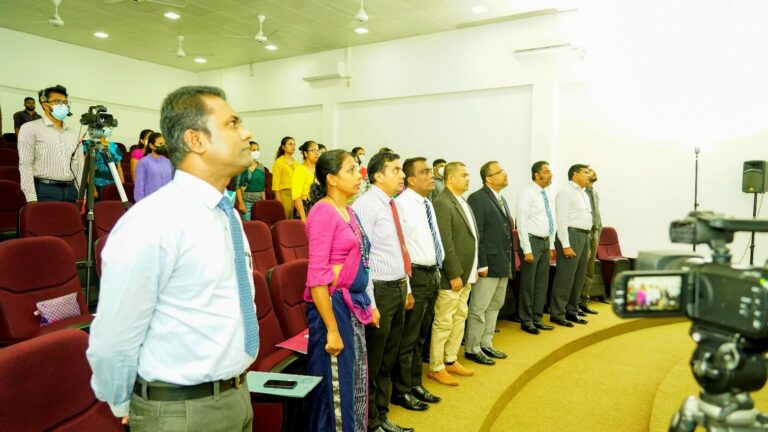
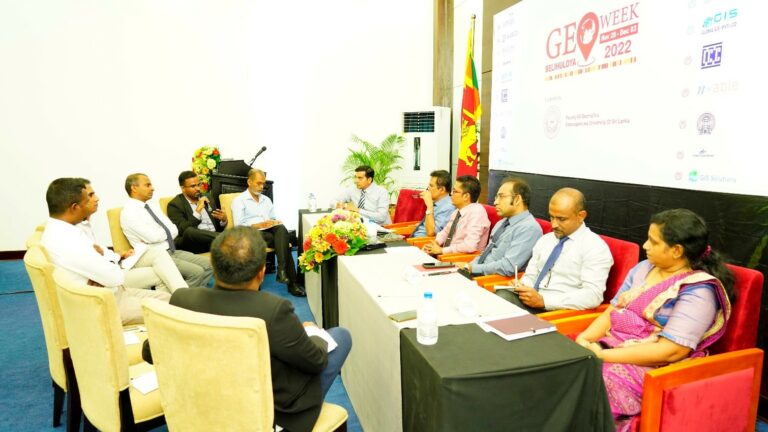
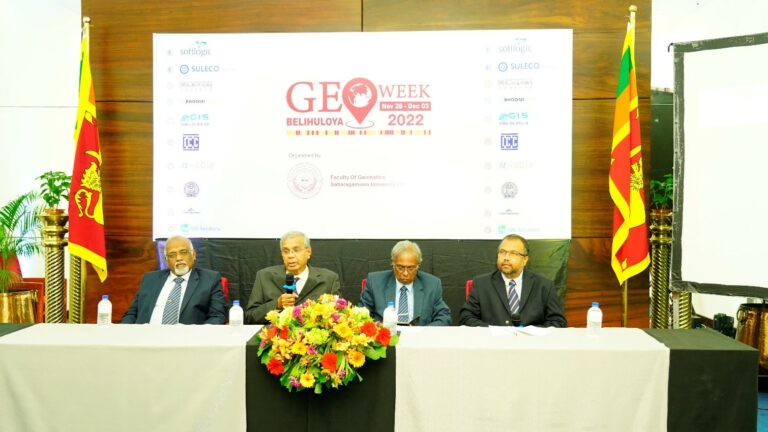
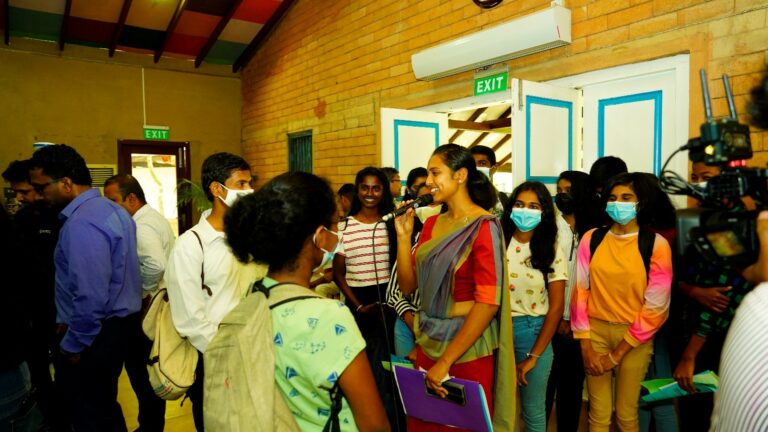
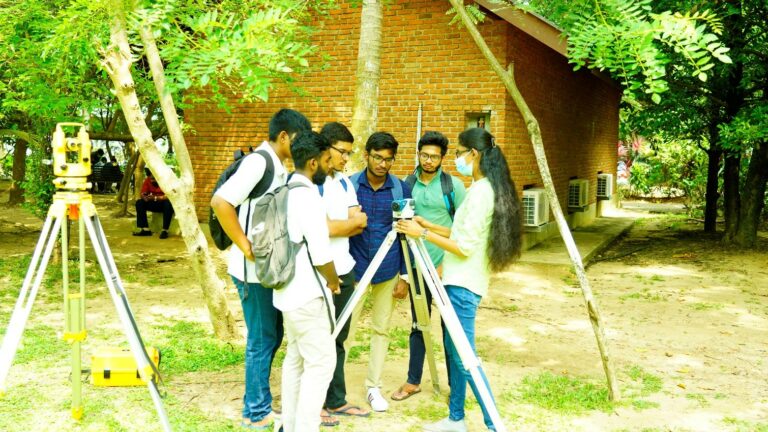
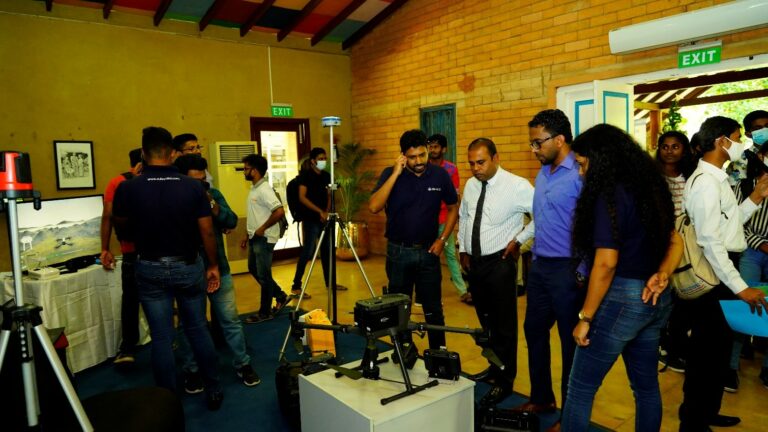
Jelena Gabela
LBS2ITS Newsletter No. 8

LBS2ITS – Smart classroom equipment
January 18, 2023
All LBS2TIS partners received smart classroom equipment as part of the effort of LBS2ITS to enhance the LBS learning experience of their students and increase their student intake. In this newsletter, all of our partners have written a section on how they are using the equipment at the moment and how they plan on using it in the future.
Jelena Gabela Majić
Univerity of Moratuwa
UoM received smart classroom equipment and professional equipment for recording and live-streaming lectures. One set of professional equipment for recording and live-streaming lessons was installed in OSGeo lab and GIS/RS lab at the Department of Town & Country Planning and another in the traffic engineering PG classroom at the Department of Civil Engineering.
The classroom equipment promotes learning through visual aids using smart technology devices such as an Interactive whiteboard, a Smart Podium, and Motion Sensor Cameras. It facilitates carrying out lecture sessions smoothly for both in-class and online participants simultaneously with many teacher-assisting functions. The Smart Interactive Board consists of a completely interactive screen with many inbuilt tools that could be used in explaining concepts, drawing graphs and images, annotating hand notes onscreen, and highlighting required sections in a lecture slide. The Smart Podium consists of an inbuilt computer with advanced features to directly connect lecture materials along with microphones suited for in-class and online lecturing and focus cameras for exhibiting physical articles and book sections onscreen. The whole classroom is recorded through a motion sensor camera which detects the movements of the lecturer giving proper visuals to distant participants. This Smart Classroom can accommodate 35-50 students, and it can be further expanded to provide visuals and have interactive sessions connecting with remote classrooms. Several demonstration sessions on these newly installed devices are conducted and yet to be carried out to acquaint the department lecturers with all the features provided by the system.
The acquisition of new equipment of EU standards has improved the teaching and learning environment of all universities. With the successful experience In UoM, similar equipment has been prioritized from the capital grant schemes available, particularly in exploiting the particular budget dedicated to the additional student intake.
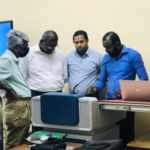
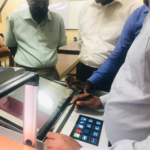
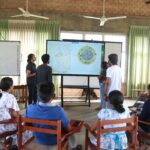
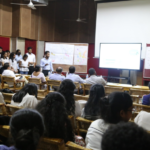
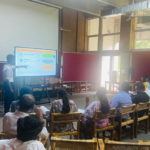
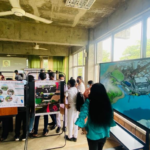
Amila Jayasinghe, Loshaka Perera and Chethika Abenayake
Kotelawala Defence University
The Faculty of Computing, KDU, received smart classroom equipment and professional equipment for recording and live-streaming lectures. The Smart Classroom equipment is placed in the Department of Computer Science, Lecture Theatre A(LT-A) and Lecture Theatre B(LT-B). The LT-A has a capacity of 40 students, and the LT-B has a capacity of 50 students. Smart Panel, Video Mixer, One moving camera focused on the lecturer; two microphones are installed at lecture LT-A, and one moving camera focused on the classroom, two microphones, and audio mixer placed at LT-B.
The classroom equipment promotes learning through visual aids using smart technology devices such as a smart panel, microphones, student focus cameras, and other audio equipment. Apart from these devices, a head-mounted VR display is placed at one of the lecture theatres. Head-mounted displays for virtual reality (HMD–VR) may be used as a therapeutic medium in physical rehabilitation because of their ability to immerse patients in safe, controlled, and engaging virtual worlds. VR display is beneficial for students, including relaxing/feeling calm, being able to explore somewhere virtually before visiting the real world, and developing learning opportunities in the university. Further, KDU is planning to utilize this VR display for research and development projects of the undergraduates and newly introduced Master of Computer Science students of the KDU.
Including KDU, all the partner universities now have new, EU-compliant equipment, which has enhanced the teaching and learning environment. Having had success in the past Similar equipment has been given priority in KDU from the available capital grant programs, especially in utilizing the specific budget set up for the increased student enrolment.
A few sample images are included to show how students are utilizing new equipment.
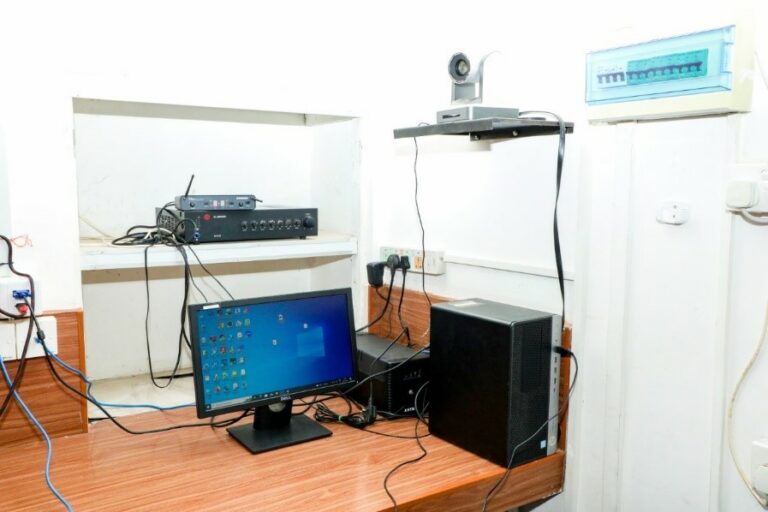
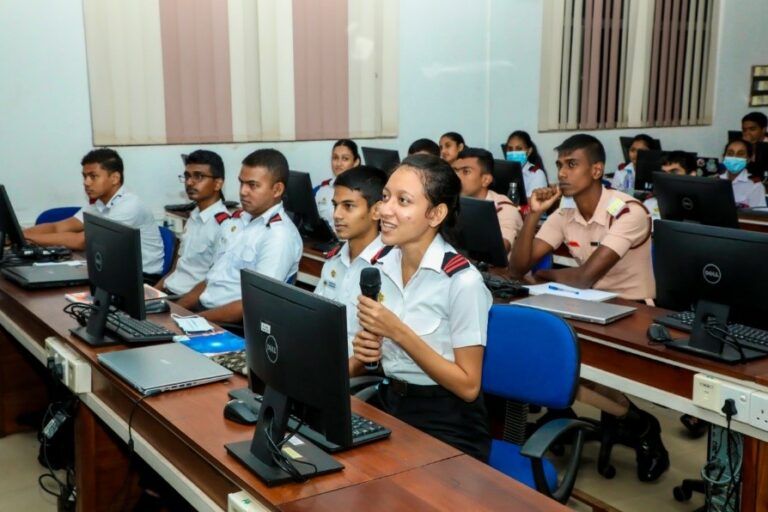
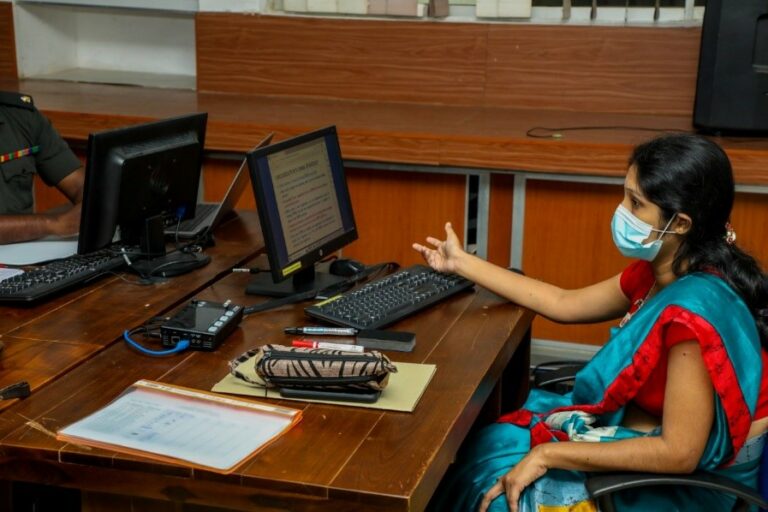
Pradeep Kalansooriya
SUSL
Through the LBS2ITS project to enrich the LBS education in geomatics and transport services, SUSL was granted smart classroom equipment and equipment for recording and live screaming.
Currently, the smart classroom equipment along with the recording and live streaming equipment is placed in the main auditorium of the Faculty of Geomatics, where the wide-reaching events and online lectures of the faculty are taking place. Smart podiums, Motion sensor cameras, wireless microphones are facilitated in the auditorium making the teacher-student and presenter-student interaction better during the large gatherings of lectures and events such as student industrial training day events, research colloquiums and research presentations such as GEOWEEK event. Further, these devices make it possible to organize hybrid (on-sight and online) lectures and events, which has been a great advantage for the lecturers and students.
The granted equipment through the project has enhanced the methods of teaching and eased learning of spatial sciences.
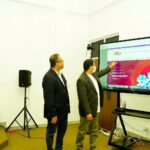
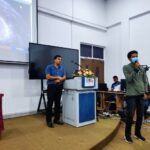
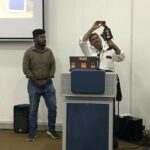
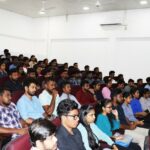
Jenan Rajavarathan
University of Sri Jayawardenapura
The Technology Faculty, Sri Jayewardenepura University received smart classroom equipment and professional equipment for recording and live-streaming lectures, including a smart panel, auto tracking camera and media station, speaker phone and graphic tablet. The smart classroom equipment set is installed in the conference room located in the lecture and research student building.
The conference room is the official space utilized by all academic staff and students. Research students use this space optimally in order to discuss with their supervisors and other academics. Smart panel is especially utilized to conduct remote lecture sessions and for remote discussions with external academics and practitioners to share their knowledge and obtain their active corporation. In addition, most of the LBS2ITS project discussions are going on in the conference room by using smart classroom equipment. The smart panel, auto-tracking camera provide facilities for online teaching activities and recording. Smart whiteboard option is highly used for framework preparation of the projects and research with comprehensive discussions.
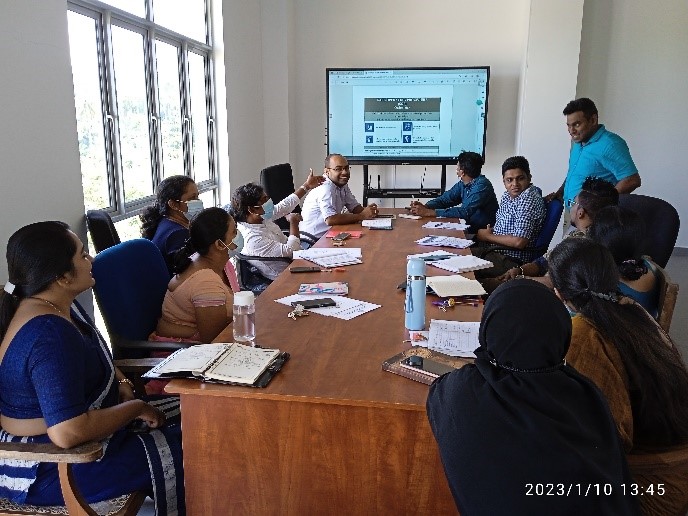
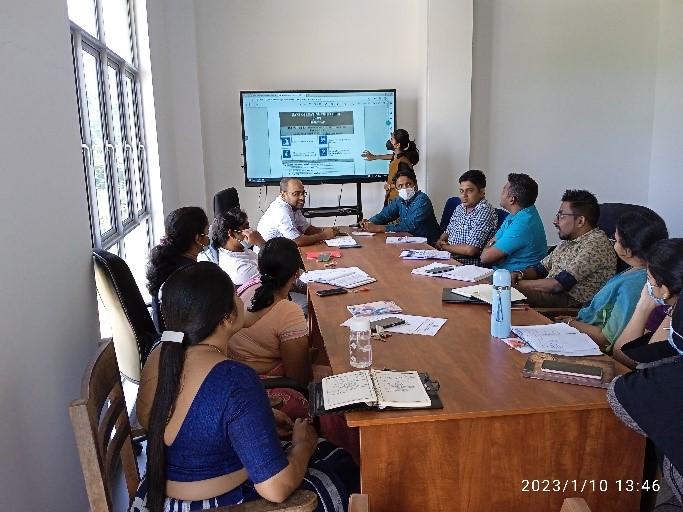
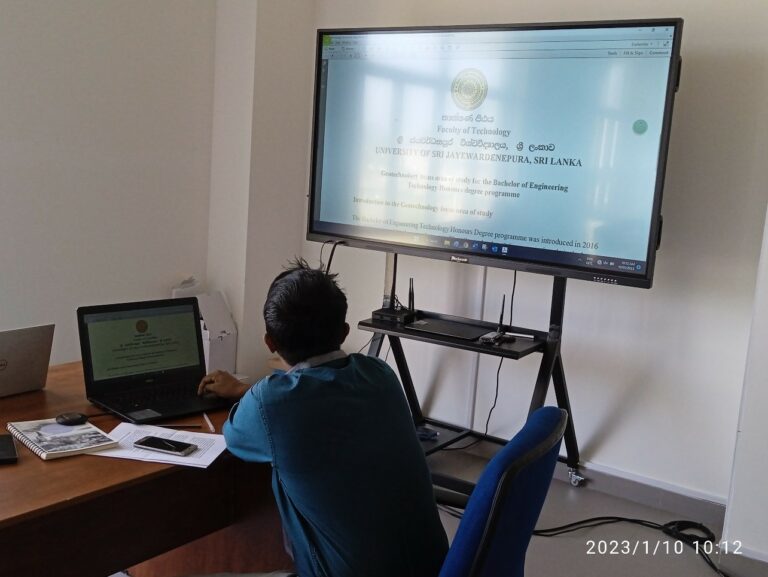
Choolaka Hewawasam
LBS2ITS Newsletter No. 7

LBS2ITS – GNSS equipment
January 18, 2023
As part of the LBS2ITS project, Global Navigation Satellite System (GNSS) equipment was purchased for all of our project partners. This contribution is here to ensure the sustainability of the, yet to come, pilot courses introduced in this project beyond its lifetime.
In this newsletter, three LBS2ITS partners will provide descriptions of the new equipment and detail on how they plan on using it.In agreement with our partners, we purchased the first batch of GNSS equipment.
Purchased equipment per partner:
University/Equipment | Stonex S900A | Stonex S70G | Stonex S70 |
SUSL | 2 | 1 | 3 |
USJ | Ø | 2 | 2 |
KDU | Ø | 1 | 1 |
UoM | Ø | 1 | 1 |
From Stonex Website:
S900A is a surveying grade GNSS receiver equipped with GNSS board 800 channels and capable of supporting multiple satellite constellations: GPS, GLONASS, BEIDOU, GALILEO, QZSS and NavIC, including L-Band correction. It is also equipped with optional IMU technology.
S70G GNSS RTK is an Android handheld GNSS with a 4-constellation dual frequency GNSS system (GPS, GLONASS, Galileo and BeiDou) that allows to collect data and photos in the field. It is supplied with an antenna connected directly to the tablet which guarantees 2cm accuracy, but if required, connecting an external antenna it gains even more precise data. S70G is able to work in real time through the reception of Real Time Kinematic (RTK) corrections. Besides working in real-time, it can also record raw data received from satellites for post-processing in the office.
S70 is an Android rugged tablet and GIS receiver. The device is enriched with numerous features that make it excellent for carrying out tasks in many fields. Thanks to the raw GNSS data output and post-processing calculation, S70 allows for obtaining sub-meter accuracy. Internal sensors include an accelerometer, e-compass, and gyroscope.
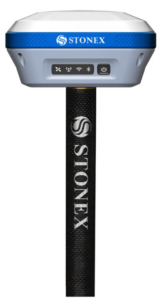
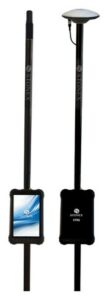
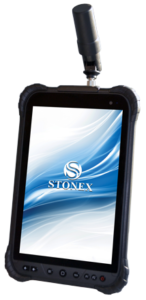
Jelena Gabela Majić
SUSL
Through the LBS2ITS project to enrich the LBS education in geomatics and transport services, SUSL was granted two geodetic grade GNSS receivers and four GIS mapping receivers.
The GNSS and mapping receivers are maintained in the technical stores by the technical staff of the faculty. The granted GNSS receivers along with the four already existing survey grade GNSS receivers in the faculty make a great combination for the students. These receivers are being utilized for teaching activities and research studies of undergraduate students, to solve existing knowledge gaps and problems in the positioning sector of Sri Lanka, such to understand the GAGAN accuracy over the Sri Lankan region, deformation analysis of Samanelawewa dam etc. Additionally, students are trained to utilize the GIS mapping receivers as potential planning and educational mapping tools for land use, mapping and management system.
This variety of geodetic and mapping grade GNSS receivers with different potentials such as (i) tracking capability of different satellite systems, (ii) tracking capability of Satellite Based Augmentation Systems (SBAS) and (iii) capability of incorporating CORS corrections etc. provides an excellent opportunity for students to experience the variety of GNSS technologies in the real world.
The granted equipment through the project has enhanced the methods of teaching and eased learning of spatial sciences with great field experiences and experiments.

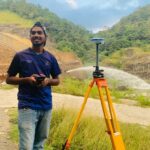
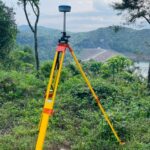
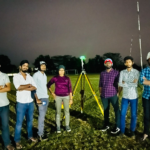
Through the LBS2ITS project to enrich the LBS education in geomatics and transport services, SUSL was granted two geodetic grade GNSS receivers and four GIS mapping receivers.
The GNSS and mapping receivers are maintained in the technical stores by the technical staff of the faculty. The granted GNSS receivers along with the four already existing survey grade GNSS receivers in the faculty make a great combination for the students. These receivers are being utilized for teaching activities and research studies of undergraduate students, to solve existing knowledge gaps and problems in the positioning sector of Sri Lanka, such to understand the GAGAN accuracy over the Sri Lankan region, deformation analysis of Samanelawewa dam etc. Additionally, students are trained to utilize the GIS mapping receivers as potential planning and educational mapping tools for land use, mapping and management system.
This variety of geodetic and mapping grade GNSS receivers with different potentials such as (i) tracking capability of different satellite systems, (ii) tracking capability of Satellite Based Augmentation Systems (SBAS) and (iii) capability of incorporating CORS corrections etc. provides an excellent opportunity for students to experience the variety of GNSS technologies in the real world.
The granted equipment through the project has enhanced the methods of teaching and eased learning of spatial sciences with great field experiences and experiments.
Jenan Rajavarathan
University of Sri Jayawardenapura
The Technology Faculty, Sri Jayewardenepura University received S70G and S70 GNSS equipment with all other related accessories. GNSS equipment is officially managed under the survey lab in the bio technology department.
GNSS equipment is highly used for field data collection activities under teaching, research and project works. Recently, we used both S70G and S70 equipment for water sampling for the purposes of conducting a study under the energy and environmental department. The task was collecting water sample locations in the field with few attributes. In addition, we practised how to use GNSS equipment for new areas such as geocoding, land use planning, and identifying locations and physical features based on the previously obtained geoinformation. The knowledge-sharing sessions were also conducted for GNSS equipment. Currently, we are teaching the students how to use this equipment for their requirements. We also prepared a manual for the GNSS equipment, which we will share with the students and staff of the faculty to learn how to use this equipment for their tasks.
GNSS equipment is very useful to improve the teaching environment and open up new pathways to start new research related to geoinformatics applications.
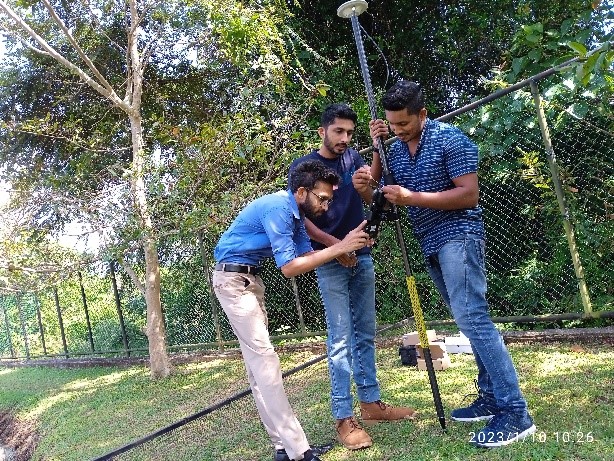
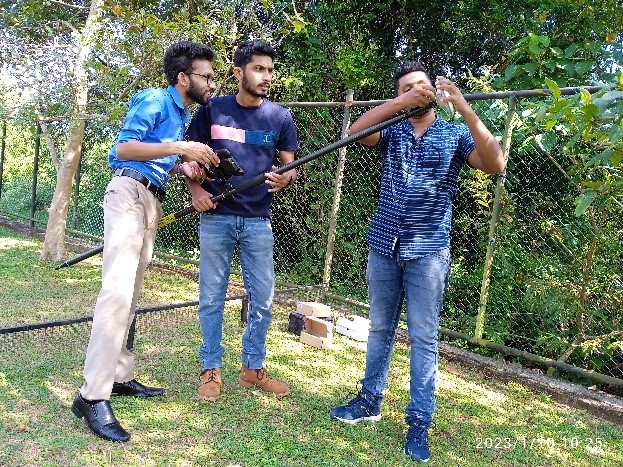
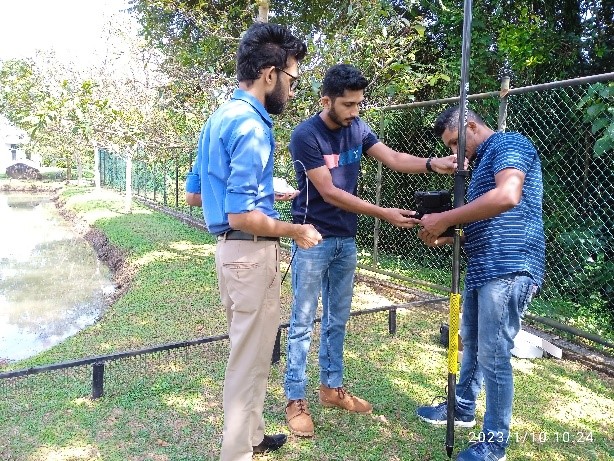
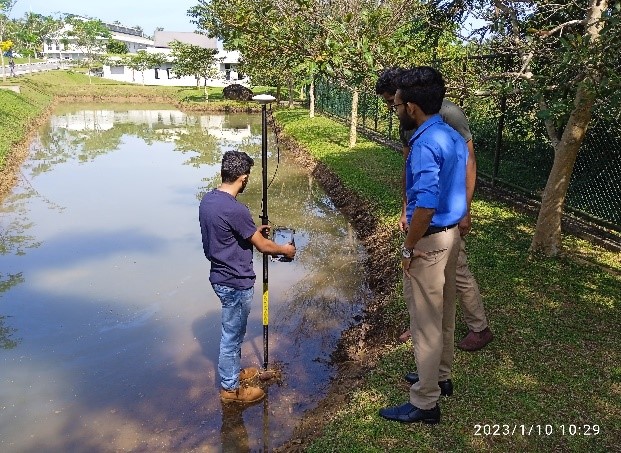
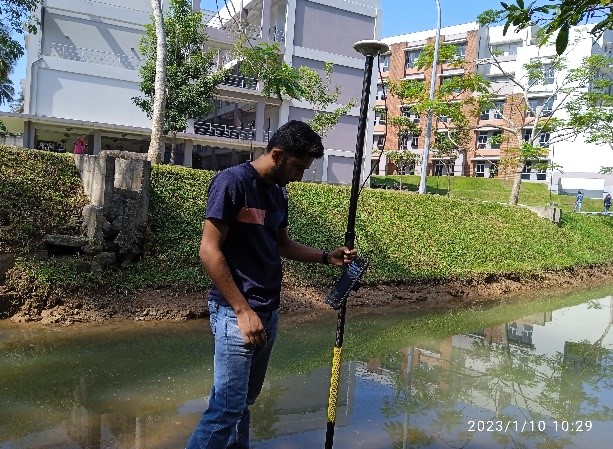
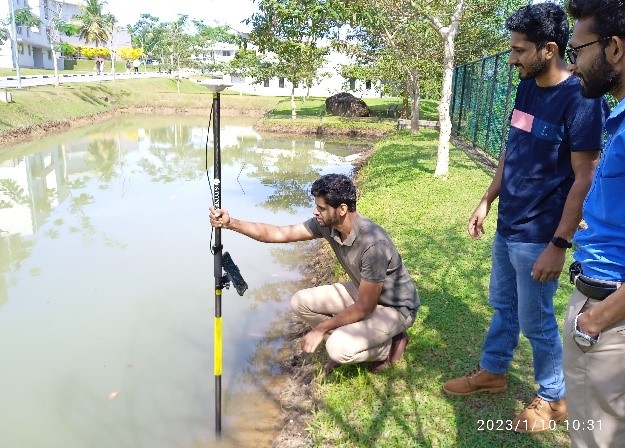
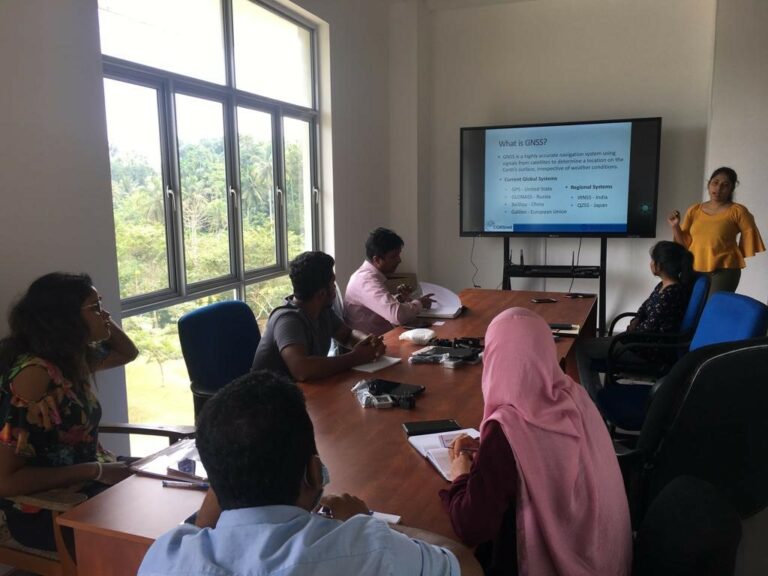
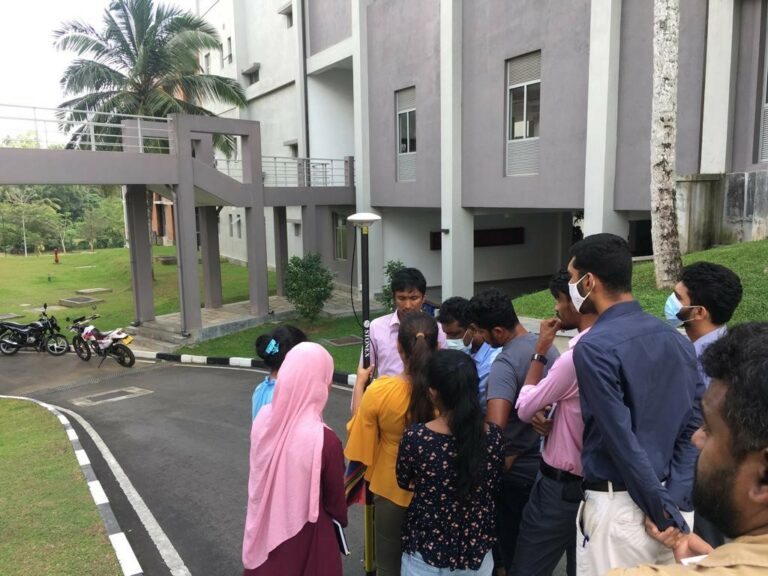
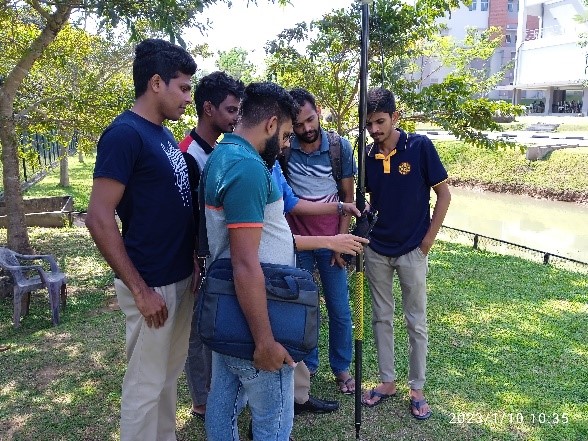
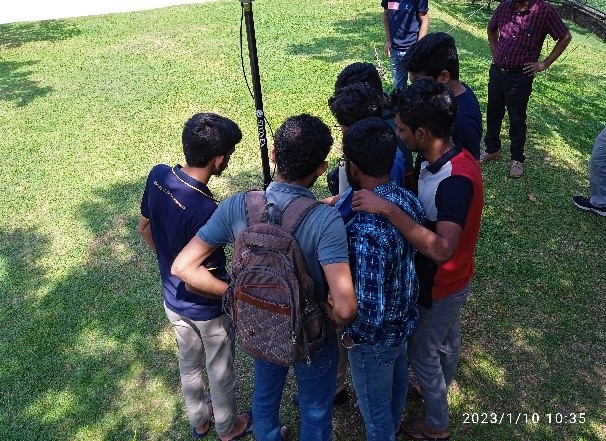
Choolaka Hewawasam
University of Moratuwa
UoM was granted two low-cost receivers and two rugged outdoor receivers. Receivers are stored at the Department of Town & Country Planning (OSGeo lab) and Department of Civil Engineering (traffic engineering lab), one for each.
UoM is planning to utilize low-cost receivers and rugged outdoor receivers in teaching and learning activities for subject modules related to urban informatics and traffic engineering. Further, students will utilize that equipment in problem-based activities (field data collection) related to land use mapping, road network mapping, etc. Professional equipment for recording and live-streaming lectures will be utilized to virtually combine OSGeo Lab and GIS/RS Lab to facilitate additional student intake and conduct a virtual course.
The acquisition of new equipment of EU standards has improved the teaching and learning environment of all universities. With the successful experience in UoM, similar equipment has been prioritized from the capital grant schemes available, particularly in exploiting the particular budget dedicated to the additional student intake.
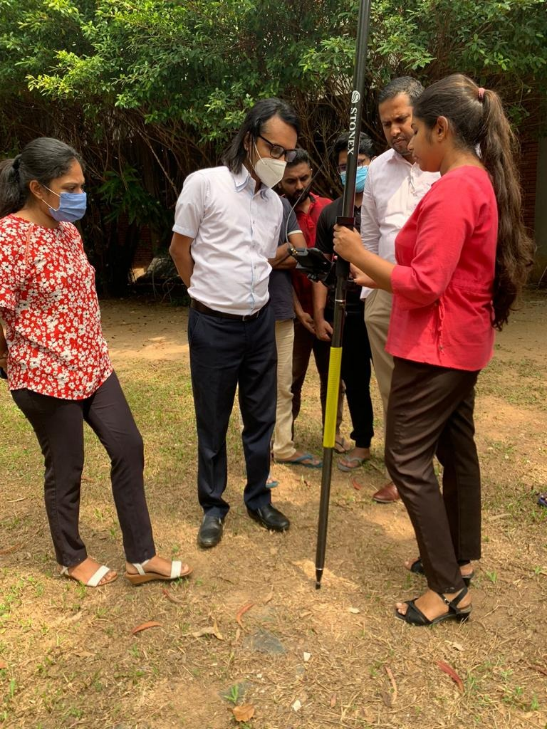
Amila Jayasinghe, Loshaka Perera and Chethika Abenayake
LBS2ITS Newsletter No. 6

Train-the-Teachers Workshop “Data and models in transportation”
November 28, 2022
The second train-the-teachers course, organised by the TU Dresden team, took place successfully at TU Dresden from Monday, 7th to Friday, 11th November 2022. The interactive two courses “Data in Transport Planning – Introduction to Data Analysis and Visualization With R” and “Introduction to Transport Modeling in MATSim” transmitted knowledge to run an agent-based transport simulation in Sri Lanka and analyse transport behaviour for different scenarios. The first part of the course included an introduction to the approach of script-based data analysis in transport planning. Therefore, the main tasks of data wrangling and visualization were shown and explained in detail. Furthermore, different visualization techniques and data preparation steps were introduced by show-casing script-based data analytics using transport-related data sets. The main goal was to highlight the advantage of the modern usage of the statistical programming language R based on the tidyverse package family https://www.tidyverse.org/
After an introduction to the agent-based approach to transport modelling and in particular the open-source transport modelling framework MATSim (www.matsim.org), the course participants were enabled to run their own basic simulation using a simple example setup on their computers. Based on that, the course participants were enabled to experiment with model settings and inspect model reactions using a visualization tool. After a subsequent in-depth introduction to the main components of the simulation, the course participants created their own basic scenario for a region of their choice using freely available data from OpenStreetMap. Finally, the results of the simulation runs were loaded into R in order to connect both streams of the course and analyse transport simulation results based on statistical R analysis methods learnt in the R stream of the course.
The two courses were accompanied by a program of supporting events for all project partners. A hike in the national park “Saxon Switzerland” in the territory of Elbe Sandstone Mountains, a visit to the Transparent Factory of Volkswagen and a ride in the Dresden Funicular Railway completed the program.
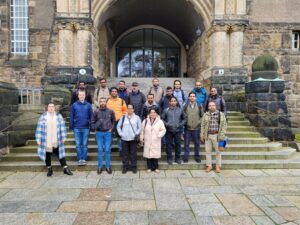
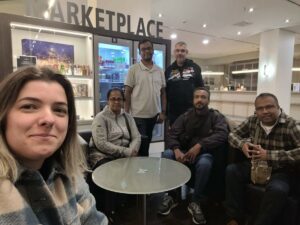
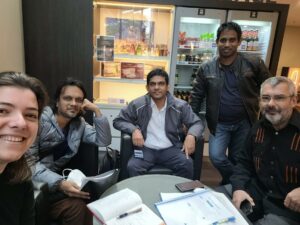
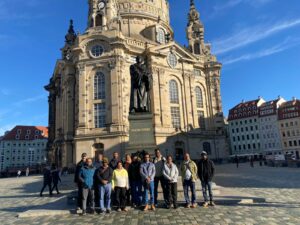
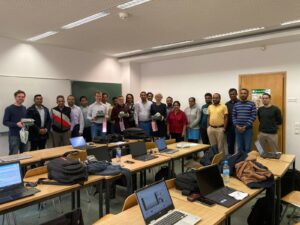
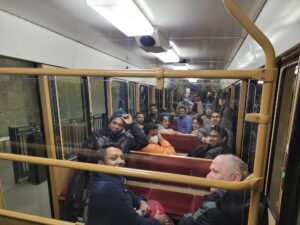
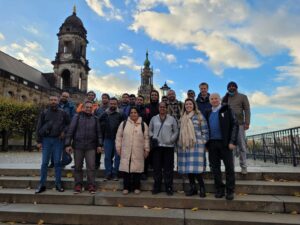
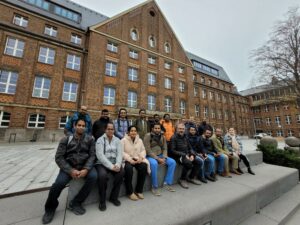
Jelena Gabela Majić
LBS2ITS Newsletter No. 5

Presenting our project at the XXVII FIG Congress in Warsaw, Poland
October 31, 2022
One of our project goals is to promote the project and disseminate it internationally to a broad audience by attending and presenting at large conferences such as the FIG Congress. XXVII FIG Congress was held in Warsaw, Poland, from 11-15 September 2022. As reported by FIG, 815 participants attended the congress on-site, and 234 attended it online. In total, there were 1049 participants from 82 countries.
Prof Guenther Retscher and I (Jelena Gabela Majić) attended this large congress and, more specifically, Commission 2 – “Professional Education” sessions. There, we contacted the new commission chair Mr Dimo Todorovski and discussed the possible participation of some of our project members in one of the working groups of Commission 2.
To further promote the project, I also presented our peer-reviewed publication, “Overview of the PBL in Geodesy, Geoinformatics and Transport Engineering Education”. This publication was written in December 2021 based on our workshop on PBL workshop held in September 2021. I led the paper, which was co-authored by all local project coordinators and other project members. All authors are Jelena Gabela Majić, Guenther Retscher, Georg Gartner, Andrea Binn (TUW), Vassilis Gikas, Ioanna Spyropoulou (NTUA), Regine Gerike (TUD), Rangajeewa Ratnayake, Amila Buddhika Jayasinghe, Loshaka Perera (UoM), Pradeep Kalansooriya, Rmm Pradeep (KDU), Choolaka Hewawasam (USJ), Thilantha Dammalage, Vipula Abeyratne (SUSL). The paper presents our project, Problem Based Learning (PBL) pedagogy and how all project partners already implement PBL (fully or partially) in their teaching. The presentation received a lot of interest, and we considered our attendance a success.
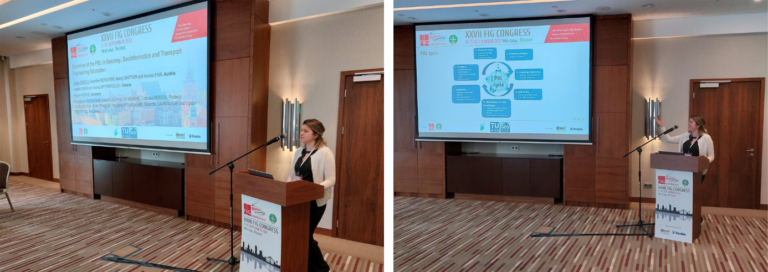
Jelena Gabela Majić at the FIG Congress in Warsaw
Following the congress, our paper was also announced as the Article of the month – October 2022. Our paper was promoted on the FIG website and in the FIG email newsletter. Therefore, the publication reached an even wider international audience than hoped. The paper can be found at this hyperlink.
Jelena Gabela Majić
LBS2ITS Newsletter No. 4

LBS2ITS - Project outcome presentations
June 18, 2022
Presentation at the ISPRS Congress in Nice, France
Guenther Retscher successfully presented an outcome of the LBS2ITS project at the XXIV Congress of the International Society of Photogrammetry and Remote Sensing in Nice, France, from June 6 to 11, 2022. His presentation on June 7 entitled ‘New Opportunities with PBeL (Problem Based e-Learning) for the Erasmus + Capacity Building in Higher Education Project LBS2ITS’ provided an insight into the integration of PBL (Problem Based Learning) with e-Learning which was developed in the course of LBS2ITS.
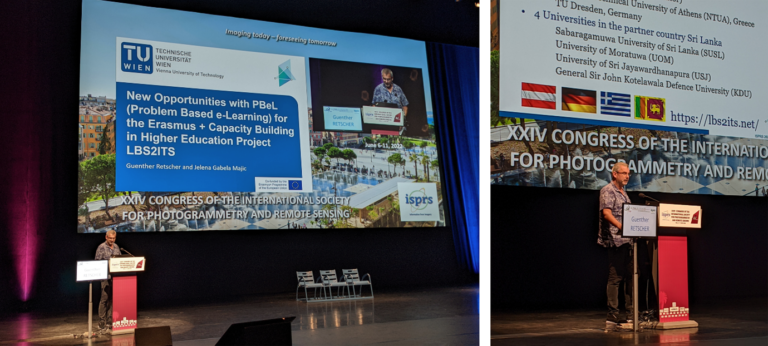
Prof. Günther Retscher at the ISPRS Congress
In the courses modernization carried out in LBS2ITS, special attention is paid to the development and/or update of the courses to be implemented with these two pedagogic forms. Thus, teaching with an emphasis on learning outcomes is a central theme building a fully immersive and integrated LBS teaching and learning experience with the LBS application of ITS in mind. As e-learning and PBL must be combined and integrated nowadays, the new term PBeL was proposed to demonstrate these developments. The approach and background information on the theory and the LBS2ITS project were presented at the congress.

The PBeL (Problem Based e-Learning) cycle
Presentation at the 8th International Conference on Higher Education Advances – HEAd’22, June 14-17, 2022, Valencia, Spain
The HEAd’22 conference was held in Valencia, Spain in June 2022 for the 8th time. It is a platform for researchers and practitioners to exchange ideas, experiences and research results relating to the preparation of students and the organization of higher education systems. More than 100 papers have been selected for presentation. The respective publication can be found at: http://ocs.editorial.upv.es/index.php/HEAD/HEAd22/paper/view/14473
Topics of presentations included themes such as
- Innovative materials and new tools for teaching
- Teaching and learning experiences
- Educational technology (e.g., virtual labs, e-learning)
- Evaluation and assessment of student learning
- Emerging technologies in learning (e.g., MOOC, OER, gamification)
- Scientific and research education
- Experiences outside the classroom (e.g., practicums, mobility)
- New teaching/learning theories and models
- Globalization in education and education reforms
- Education economics
- Entrepreneurship and learning for employment
- Education accreditation, quality, and assessment
- Competency-based learning and skill assessment
from participants from all over the world.
Georg Gartner from TU Wien presented the paper “From project-based to problem-based learning in engineering disciplines: enhancing cartography and geomatics education”, collaboratively written by Georg Gartner, Andrea Binn, Jelena Gabela, Günther Retscher, Vassilis Gikas, Manuela Schmidt and Wangshu Wang, where the experiences of our LBS2ITS project have been shared. The presentation was well received and several follow-up contacts have been built. Based on the questions and feedback the lessons learned will be used to enhance parts of our project work.
Günther Retscher and Georg Gartner
LBS2ITS Newsletter No. 3

Train-the-Teachers Workshop “Transportation system planning for smart and liveable cities”
April 4, 2022
The first train-the-teachers workshop “Transportation system planning for smart and liveable cities” in the LBS2ITS project, took place from 28 March to 1 April 2022 at the University of Moratuwa (UOM) in Sri Lanka. The workshop was organized jointly by the LBS2ITS team from TU Dresden, who was, amongst others, responsible for the concept, providing material, and lecturing. The local organizing committee from KDU and UOM provided a great venue for the workshop at the green UOM campus with the best working conditions despite the economic crisis in the country and various related difficulties.
Around 20 participants from all Sri Lankan partner universities in LBS2ITS took part and formed an interdisciplinary and engaged group with backgrounds in civil engineering, surveying, geomatics, computer science, town planning and transportation. In addition, external stakeholders from ministries, public transport operators and further institutions joined selected lectures.
The workshop’s goal was to train lecturers from the Sri Lankan partner universities both in terms of domain knowledge on transportation planning and traffic engineering and on didactic concepts for teaching and particularly on problem-based learning (PBL). It was organized as a mixture of lectures given by Prof. Udo Becker and Prof. Regine Gerike from TU Dresden and interactive group work and discussions.
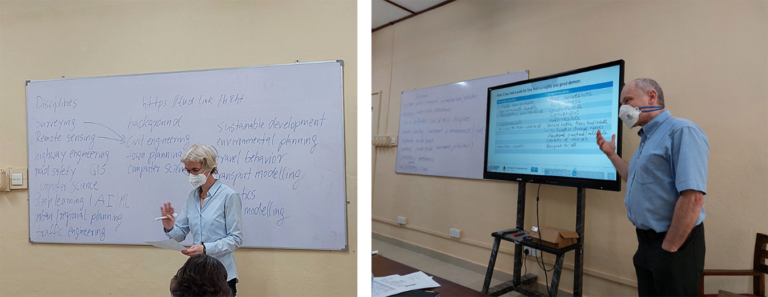
Prof. Regine Gerike and Prof. Udo Becker
The workshop’s opening was an official welcome from UOM, followed by a welcome from the LBS2ITS organization team and an interactive introduction round of the participants. The first lecture, “Goals, visions, challenges, emerging trends in transport”, discussed basic concepts in transportation planning, raised awareness for rebound effects and invited to discuss problems and opportunities in shaping future transportation systems. Based on this lecture, groups were formed, and issues for the group work were defined in the afternoon.
The workshop followed a similar structure for the next three days, Tuesday to Thursday: Group work was possible in the morning and afternoon, and lectures were given before and after lunch. This allowed external experts to join for selected topics and lectures and network during the lunch break. Results from the group work were presented on Friday, followed by a short feedback round and a farewell lunch. Each day, there were tea breaks in the morning and afternoon and a delicious lunch. Together with the social event on Friday, these breaks provided great opportunities for follow-up discussions.
The lectures first served to present research results and current developments in transportation planning from the European perspective and second to exchange perspectives. For each of the six lectures, one topic was chosen beforehand with the Sri Lankan partners in the preparatory video conferences. The topics ranged from strategic sustainable urban mobility plans (SUMPs) and functional street network classification to design principles for safe, efficient and liveable streets. Monitoring and evaluation, as well as externalities, were also covered. Throughout the lectures, there were lively discussions on challenges, opportunities and the current situation in Europe and Sri Lanka.
Three topics were chosen for the group work:
· 15-minute-city: The example of Paris inspired this group with the ambition to provide access to relevant destinations within 15 minutes of walking or cycling (see, e.g. https://www.15minutecity.com/). The group developed an interdisciplinary PBL-concept for training competencies in GIS, urban and transportation planning, and stakeholder interviews.
Next-generation public transport in Colombo: The second group developed a concept for promoting public transport and stopping the current trend of decreasing public transport ridership. The concept was based on transit-oriented development principles in pre-defined corridors that should ideally be served by rail-based public transport or alternatively by bus services. Improvements for the bus fleet were suggested and solutions to enable the shift to more attractive vehicles and services in public transport.
Street design standards: The third group worked on design principles for safe and liveable streets in Sri Lanka. Main problems and trends were identified in the first step, followed by the proposition of solutions and the suggestion of design standards.
It was a great week, and we thank our Sri Lankan partners for their hospitality and for providing a welcoming atmosphere inviting discussions and supporting a mutual understanding between the different disciplines and between Sri Lankan and European perspectives.
Regine Gerike on behalf of the TU Dresden team
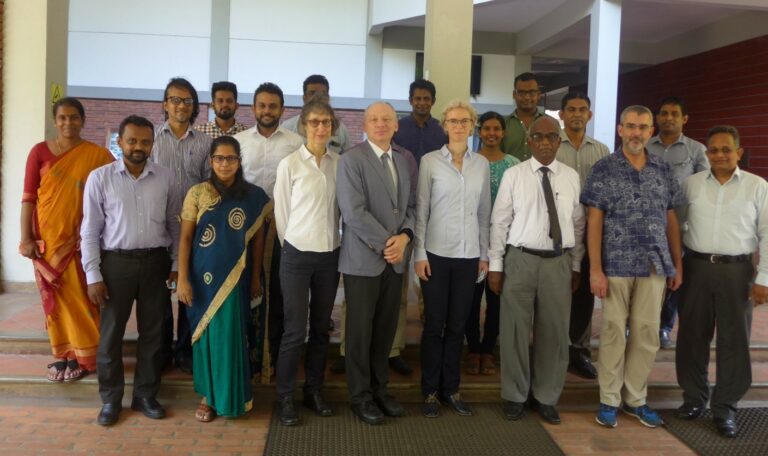
LBS2ITS Newsletter No. 2

Transportation Site Visit
March 27, 2022
One day before the start of the first train-the-teachers course on ‘Transport System Planning for Smart and Liveable Cities’ in the LBS2ITS project, the colleagues from TU Dresden and I had the opportunity to visit a transportation-related site visit led by colleagues from the University of Moratuwa.
The first stop was the Expressway control centre in Galanigama, which monitors the traffic on the southern Expressway is from Kottawa to Kathragama via Galle, Matara and Beliatta. Around 150 staff members are responsible for tasks ranging from monitoring the traffic flow to emergency response in the case of an incident.
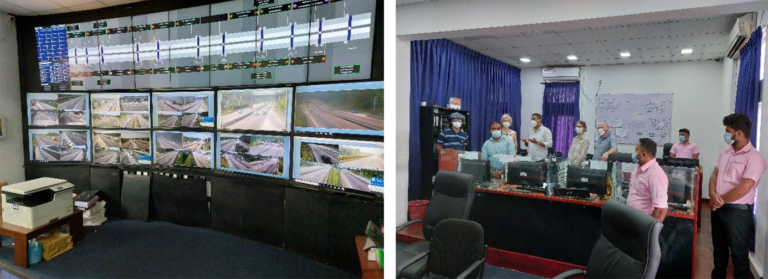
Site visit at the Expressway control centre in Galanigama
At the following stop, the new facilities of the Kottawa Multi-modal hub south of Colombo were visited. This very modern multi-modal traffic hub serves a greater area within Sri Lanka with mainly long-distance overland buses and local buses, and other means of transportation. A train line is also connected to the bus terminal, although the train traffic is not as heavy as that of the busses except in morning and evening rush hours during the week. As we visited on a Sunday around noon, there was not much traffic going on.
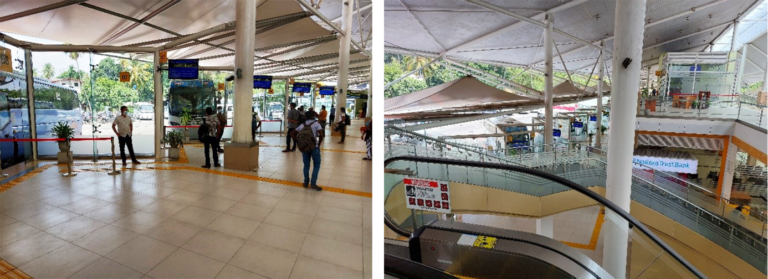
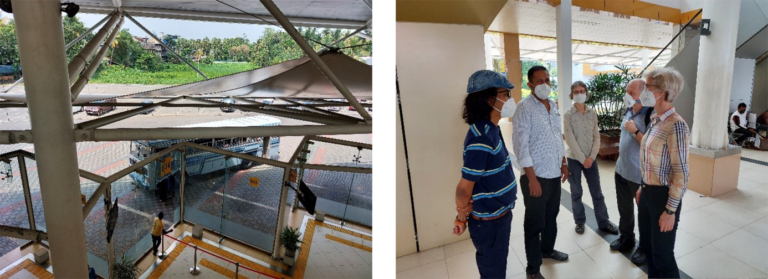
At the Kottawa Multi-modal hub
The third stop was made at the Maradana Railway Station, visiting the railway control centre. This control centre is located in the historical building of the train stations. After visiting the control centre, the station building and the platforms were also visited. The train stations serve mainly local travelling within the greater Colombo area.
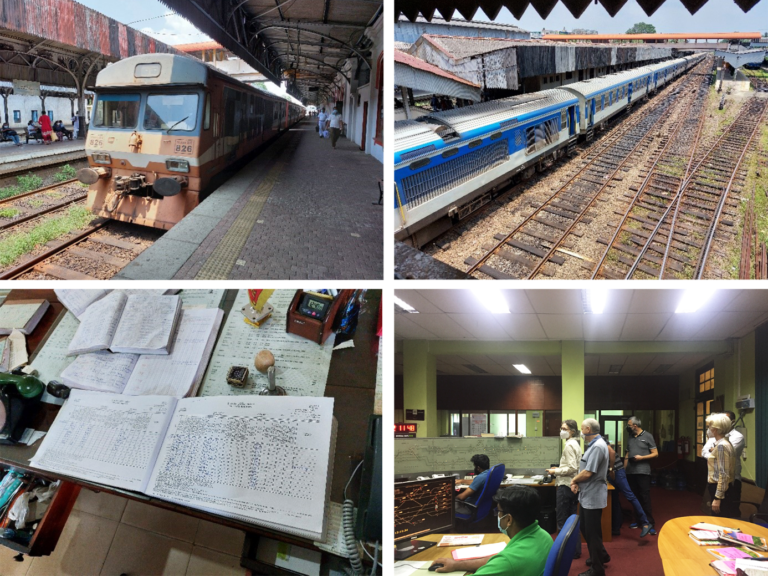
Visiting the Maradana railway station
This day visit gave a good insight about local travel conditions for starting the training course on the next day.
Günther Retscher
LBS2ITS Newsletter No. 1

First Sri Lankan Visit of the Project Coordinator Guenther Retscher with all Partners and their Representatives
January 31 to February 12, 2022
Already in the second year of the project’s lifetime, the LBS2ITS project coordinator Guenther Retscher had the chance to meet all partners in person during his first visit to Sri Lanka. All previous meetings had to be held virtually due to the COVID-19 pandemic.
The warm welcome and reception from the Vice-Chancellor Major General Milinda Peiris at the General Sir John Kotelawala Defence University (KDU) (link to KDU website) was the first highlight of Guenther’s visit. With the Dean of Graduate Studies Brigadier RGU Rajapakshe RSP, future collaboration with joint supervision of PhD students between TU Wien and KDU was initiated. An adjunct professorship was offered to Guenther Retscher.
With the KDU team led by Dr. Pradeep Kalansooriya, the dissemination strategies of the project results were discussed in detail. His team is responsible for the website and the social media appearance of LBS2ITS. Further improvements for the appearance and visibility of the project were initiated. Moreover, the planning of the train-the-teachers courses was followed up. At KDU the train-the-teachers course on Smartphone positioning techniques for in- and outdoor localization is scheduled for the end of August 2022.
The following partner visited by Guenther was the University of Sri Jayewardenepura (USJ) with his Faculty of Technology. This faculty now resides on a new University campus in Pitipana – North Homagama to the East of Nugegoda and was built just two years ago. New laboratories and classrooms are available for the students on this campus. Guenther had fruitful discussions with the Dean of the Faculty Prof. Nilmini Liyanage about future directions to go in the collaboration with TU Wien and all LBS2ITS project partners.

Reception by Dean Prof. Nilmini Liyanage at USJ
The local coordinator of the USJ project team Dr. Choolaka Hewawasam, his team and Guenther finalized the preparation for the first on-site workshop on Quality assurance (QA) in teaching, which was held successfully in the following week from February 7 to 8. This workshop had to be split previously into two parts, a virtual part held from November 16 to 17 online and the on-site part mentioned before. All Sri Lankan project partners sent four participants each to attend this workshop. The Vice-Chancellor of USJ Senior Prof. Sudantha Liyanage joined also the workshop attendees during one evening for a discussion of future collaborations in education and research.
The next visit was paid to the local coordinators Amila Buddhika Jayasinghe and Loshaka Perera of the University of Moratuwa (UOM). At UOM, Guenther met with the Deputy Vice-Chancellor Prof. PKS Mahanama and the representatives of the Departments of Town and Country Planning and Civil Engineering with the project partner of the Transportation Engineering Group. With the head of this group Prof. C. Jayasinghe, future collaboration was also explored.
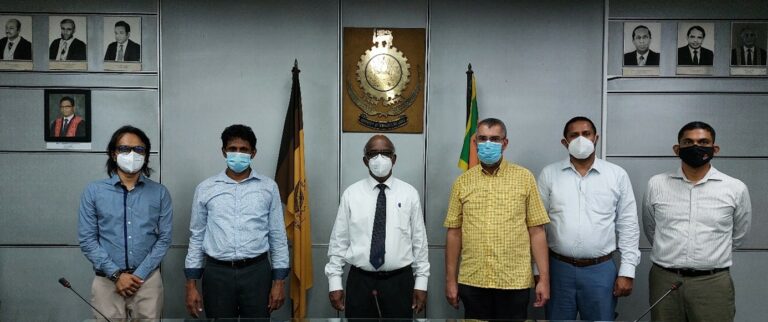
Meeting the team at UOM
In addition, at UOM Guenther had the opportunity to meet the representatives of the company Prome Engineering who showcased their equipment for ‘smart classrooms’ (https://smartclassroom.lk/). With the LBS2ITS project funds, a modernization of the facilities of the four partner Universities for distance learning is foreseen towards the implementation of smart classrooms.
After the above-mentioned workshop on QA in teaching at USJ, Guenther Retscher travelled together with the European project partner from the National Technical University of Athens (NTUA) Prof. Vassilis Gikas to the town of Belihuloya in the mountainous inland of the island in the second week of his stay in Sri Lanka. Sabaragamuwa University of Sri Lanka (SUSL) with its Faculty of Geomatics is located in this tranquil town. With the Dean of the Faculty Mr. Vipula Abeyratne – who is also the local coordinator of the LBS2ITS project team from SUSL – preparatory work on the train-the-teachers course on Alternative Positioning, Navigation and Timing (PNT) technologies was intensified. This course is scheduled to be held from May 2 to 6, 2022. The site at SUSL for the practical fieldwork and laboratory facilities were inspected and selected for this course.
An important meeting was also held with Mr. Rajitha Jayasinghe from SULECO (Pvt) Ltd during Guenther’s stay in Sri Lanka. His company was previously selected to deliver new GNSS (Global Navigation Satellite Systems) equipment from the Italian manufacturer Stonex ® Slr to all four partner Universities. In this meeting, the last equipment purchase contract with KDU was also be signed. Mr. Jayasinghe indicated and offered his full support for the project which is guaranteed even beyond the lifetime of the project.
For the project coordinator Guenther Retscher the first Sri Lankan visit in the course of LBS2ITS offered a great opportunity to meet again with already known partners and for the first time in person with the new partners to discuss the project’s progress and the planning of the upcoming train-the-teachers courses and workshops. A quite ambitious and challenging schedule of all courses was developed which has to be implemented in the two remaining years of the LBS2ITS project.
Thank you for the warm welcome from all partners and the successful discussions in the amazing country Sri Lanka!
Günther Retscher
